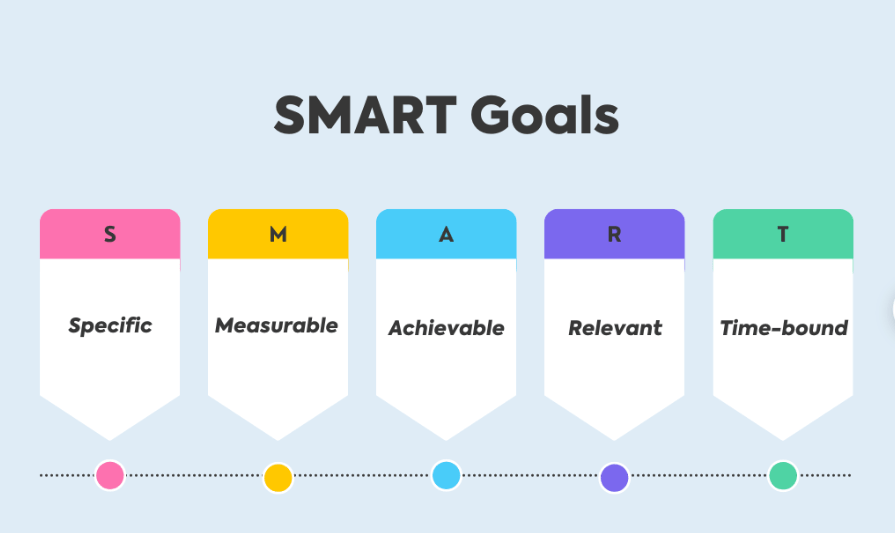Knowing how to set appropriate goals is a common struggle for most college students. Successful goal setting involves creating SMART Goals – specific, measurable, achievable, relevant, and time-bound objectives.
This enlightening article provides 10 concrete examples of SMART goals tailored specifically for the unique needs of university attendees.
Key Takeaways
- SMART goals are specific, measurable, achievable, relevant, and time-bound objectives that help college students plan their time and succeed academically.
- Some examples of SMART goals for college students include improving GPA, getting involved in campus activities, securing internships, maintaining healthy habits, making meaningful connections with professors, developing a self-care routine, reading for personal growth, setting long-term career goals, managing time and stress effectively and continuously improving academic skills.
- Setting specific and measurable goals is crucial for college students as it helps them focus on what they want to achieve and track their progress over time.
- By following the SMART goal framework and implementing effective goal-setting strategies like prioritizing tasks and practicing self-care activities regularly,
What are SMART Goals and Why are They Important for College Students?

SMART goals make college life easier. They help students plan their time well. These goals are specific, measurable, attainable, relevant and time-bound.
Setting SMART goals lets you know how to use your time. If you want better grades, a SMART goal may be to study two hours each day. This helps you focus on what is important.
Employers like it when students set SMART goals too. It shows that the student can plan well and meet targets in good time.
SMART goals are a road map for success in college and beyond!
10 SMART Goal Examples for College Students
Improve GPA: Set a goal to raise your grade point average by a specific amount, such as achieving a 3.5 or higher.
Get involved in campus activities: Aim to join clubs, organizations, or sports teams to develop new skills and make connections outside of the classroom.
Secure internships: Set a goal to obtain at least one internship in your field of interest to gain practical experience and enhance your resume.
Maintain healthy habits: Establish goals for exercising regularly, eating well-balanced meals, getting enough sleep, and managing stress effectively.
Make meaningful connections with professors: Strive to establish relationships with your professors through active participation in class and attending office hours for guidance and mentorship opportunities.
Develop a self-care routine: Dedicate time each day or week for activities that promote relaxation and well-being, such as meditation, journaling, or engaging in hobbies you enjoy.
Read for personal growth: Challenge yourself to read a certain number of books on topics that interest you outside of your coursework.
Improve GPA
Getting a better GPA is a good goal. It shows you want to do well in school. You don’t have to fix your GPA all at once. Look at one or two classes where you need help. Then, try new ways of studying for those classes.
You can also ask your teachers for more help if you need it.
A higher GPA makes you stand out from other students when finding jobs after college. Employers like students who do well in their studies because it shows they work hard and can learn new things fast.
So, setting this SMART goal will not just make your time in college successful but also help with career planning after graduation.

Get involved in campus activities
Joining campus activities is a great goal for college students. It helps you meet new friends. You can learn new skills too. There are many clubs and teams to join on most campuses.
Find one that fits your interests. Don’t be shy about trying new things. Being part of these groups can make college more fun! It also looks good on your resume when you start job hunting after school ends.
Secure internships
Securing internships is an important SMART goal for college students. By gaining hands-on experience in their chosen field, students can enhance their skills and knowledge while also building professional networks.
Internships provide valuable opportunities to apply classroom learning to real-world situations and make a positive impression on potential employers. Additionally, internships often lead to job offers or help students decide if a particular career path is the right fit for them.
With the SMART goal framework, college students can set specific objectives such as researching internship opportunities, preparing strong applications, and actively seeking out networking events where they can connect with professionals in their desired industry.
Setting this goal will enable college students to gain practical experience that will benefit their future careers.
Maintain healthy habits
Maintaining healthy habits is crucial for college students to thrive both academically and personally. By prioritizing their physical and mental well-being, students can enhance their focus, productivity, and overall happiness.
Some SMART goals related to maintaining healthy habits include exercising for at least 30 minutes three times a week, eating balanced meals with plenty of fruits and vegetables, getting enough sleep each night, managing stress through relaxation techniques or hobbies, staying hydrated throughout the day, limiting screen time before bed to improve sleep quality, and taking breaks during study sessions to prevent burnout.
By setting these specific goals and committing to them in a time-bound manner, college students can ensure they are taking care of themselves while pursuing their education.
Make meaningful connections with professors
Building meaningful connections with professors is an important goal for college students. These connections can provide numerous benefits, such as mentorship, guidance, and networking opportunities.
By actively engaging with their professors outside of the classroom, students can gain valuable insights into their fields of study and receive personalized advice on academic and career-related matters.
This goal can be achieved by attending office hours regularly, participating in class discussions, and seeking feedback on assignments. By fostering strong relationships with their professors, college students can enhance their educational experience and set themselves up for success in the future.
Develop a self-care routine
Developing a self-care routine is important for college students to maintain their physical and mental well-being. Taking care of oneself can help reduce stress, improve focus and concentration, and enhance overall happiness.
It involves setting aside time for activities that promote relaxation and self-reflection, such as exercise, meditation, or engaging in hobbies. By incorporating self-care into their daily lives, college students can better manage the demands of their academic responsibilities while also prioritizing their own health and well-being.
Read for personal growth
Reading for personal growth is an important SMART goal for college students. By setting aside time to read regularly, students can expand their knowledge, improve their critical thinking skills, and enhance their overall personal development.
Reading books or articles related to their field of study or other areas of interest can provide valuable insights and perspectives that can contribute to both academic success and career planning.
Whether it’s reading about new technology advancements or exploring different cultures through literature, incorporating reading into daily routines can lead to continuous learning and self-improvement.
Set long-term career goals
Setting long-term career goals is essential for college students. By having a clear vision of where they want to go in their future careers, students can make informed decisions and take the necessary steps to achieve their objectives.
Long-term career goals provide direction and motivation, helping students focus on what they need to do in order to succeed professionally. Whether it’s aiming for a specific position or industry, obtaining advanced degrees or certifications, or starting their own business, setting long-term career goals allows students to pave the way for a successful and fulfilling professional life.

Manage time and stress effectively
College can be a busy and stressful time, but with effective time management and stress management skills, you can stay on top of your responsibilities and maintain your well-being.
One SMART goal for effective time management is to create a daily schedule or use an editable daily planner template to prioritize tasks and allocate specific time blocks for studying, attending classes, completing assignments, and taking breaks.
This will help you stay organized and make the most of your available time. Additionally, setting boundaries around technology usage can also be helpful in managing distractions and staying focused on your priorities.
When it comes to managing stress, one SMART goal could be to incorporate regular self-care activities into your routine. Whether it’s practising mindfulness techniques like deep breathing or meditation, engaging in physical activity such as yoga or going for walks, or carving out leisure time for hobbies or relaxation activities that bring joy and reduce stress levels.
It’s important to recognize when you need a break from academic pressures and give yourself permission to recharge.
Continuously improve academic skills
To excel in college, it’s important for students to continuously improve their academic skills. This means enhancing their abilities in areas like reading, writing, critical thinking, and problem-solving.
By setting SMART goals focused on academic improvement, college students can develop a growth mindset and take proactive steps towards becoming better learners. Examples of these goals include dedicating specific time each day or week for studying, seeking additional help from professors or tutors when needed, participating actively in classroom discussions, and consistently completing assignments on time.
By actively working to improve their academic skills, students can enhance their learning experience and set themselves up for success both inside and outside the classroom.

Tips for Setting and Achieving SMART Goals
To ensure success in goal-setting, college students should follow these tips: set specific and measurable goals, make sure they are achievable and relevant to their academic and personal growth, and define a time-bound plan for achieving them.
Specific
Setting specific goals is crucial for college students because it helps them focus on what they want to achieve. Being vague or general with your goals can leave you feeling overwhelmed and unsure of where to start.
By making your goals specific, such as improving your GPA by half a point or getting involved in two campus clubs, you give yourself clear direction and a target to work towards. Specific goals also make it easier to measure progress and determine when you have achieved them.
So, instead of saying “I want better grades,” set a specific goal like “I will raise my GPA from 3.0 to 3.5 this semester.” This clarity will keep you motivated and increase your chances of accomplishing your objectives during college life.
Measurable
Measurable goals are those that can be quantified or tracked in some way. In the context of college students, measurable goals help you to see your progress and determine if you’re on track to achieving your objectives.
For example, setting a goal to improve your GPA by 0.5 points within one semester is a measurable goal because it allows you to track your grades over time and measure how close you are to reaching your target.
When you set measurable goals, it gives you a clear sense of direction and motivates you to stay focused on what needs to be done. By regularly assessing your progress, you can make adjustments or celebrate milestones along the way, which helps keep momentum going towards accomplishing your goals.
Remember that setting achievable metrics for yourself helps build confidence by showing concrete evidence of improvement and growth throughout your college journey. Having specific numbers or benchmarks also provides a sense of accountability as it allows both yourself as well as others (such as professors or advisors) who may be supporting you in achieving these goals an objective measure against which they can evaluate progress and offer guidance when necessary.
Achievable
One important aspect of setting SMART goals for college students is ensuring that the goals are achievable. This means that the objectives should be realistic and within reach, considering factors such as time constraints, resources available, and personal abilities.
For example, setting a goal to improve GPA by one full letter grade in a single semester may not be feasible. Instead, a more achievable goal could be to increase GPA by 0.2 points over the course of an academic year.
By setting attainable goals, college students can maintain motivation and make steady progress towards their desired outcomes.
Relevant
Relevant goals are important for college students because they help them stay focused and aligned with their overall objectives. When setting SMART goals, it’s crucial to ensure that they are relevant to your current situation and aspirations.
For example, as a technology student, a relevant goal could be to secure an internship in a tech company to gain hands-on experience in your field of study. This goal not only aligns with your career aspirations but also provides you with practical skills that employers value.
Another relevant goal could be to develop proficiency in a specific programming language or software tool, which can enhance your resume and increase your chances of landing a job in the technology industry.
Time-bound
Setting time-bound goals is crucial for college students because it helps them stay focused and motivated. By establishing deadlines, students can track their progress and ensure that they are making steady advancements towards their objectives.
For example, a time-bound goal could be to improve GPA by the end of the semester or to secure an internship before summer break. These specific timelines provide a sense of urgency and accountability, encouraging students to prioritize their tasks effectively.
Additionally, time-bound goals allow students to manage their workload efficiently by breaking down larger goals into smaller actionable steps with designated deadlines. This approach promotes better planning and organization skills, leading to increased productivity and success in both academic and personal endeavours.

Conclusion
In conclusion, setting SMART goals is crucial for college students to achieve academic success and personal growth. By following the specific, measurable, attainable, relevant, and time-bound framework, students can improve their GPA, get involved in campus activities, secure internships, and develop essential skills.
With effective goal-setting strategies in place, college students can stay motivated and focused on their long-term career aspirations while managing their time and stress effectively.
Start setting your SMART goals today and take charge of your college journey!
Frequently Asked Questions
What does SMART stand for in SMART goals?
SMART stands for Specific, Measurable, Achievable, Relevant, and Time-bound.
How can I set a specific goal as a college student?
To set a specific goal, clearly define what you want to achieve and be specific about the details such as the subject or area of focus.
How can I make my goals measurable?
Make your goals measurable by setting criteria that allows you to track progress and determine when the goal has been achieved.
What is an example of an achievable goal for college students?
An achievable goal could be improving time management skills by creating a schedule and sticking to it consistently.
Why is it important to set time-bound goals?
Setting time-bound goals helps create a sense of urgency and motivates you to take action within a specified timeframe, ensuring progress towards your objectives.




